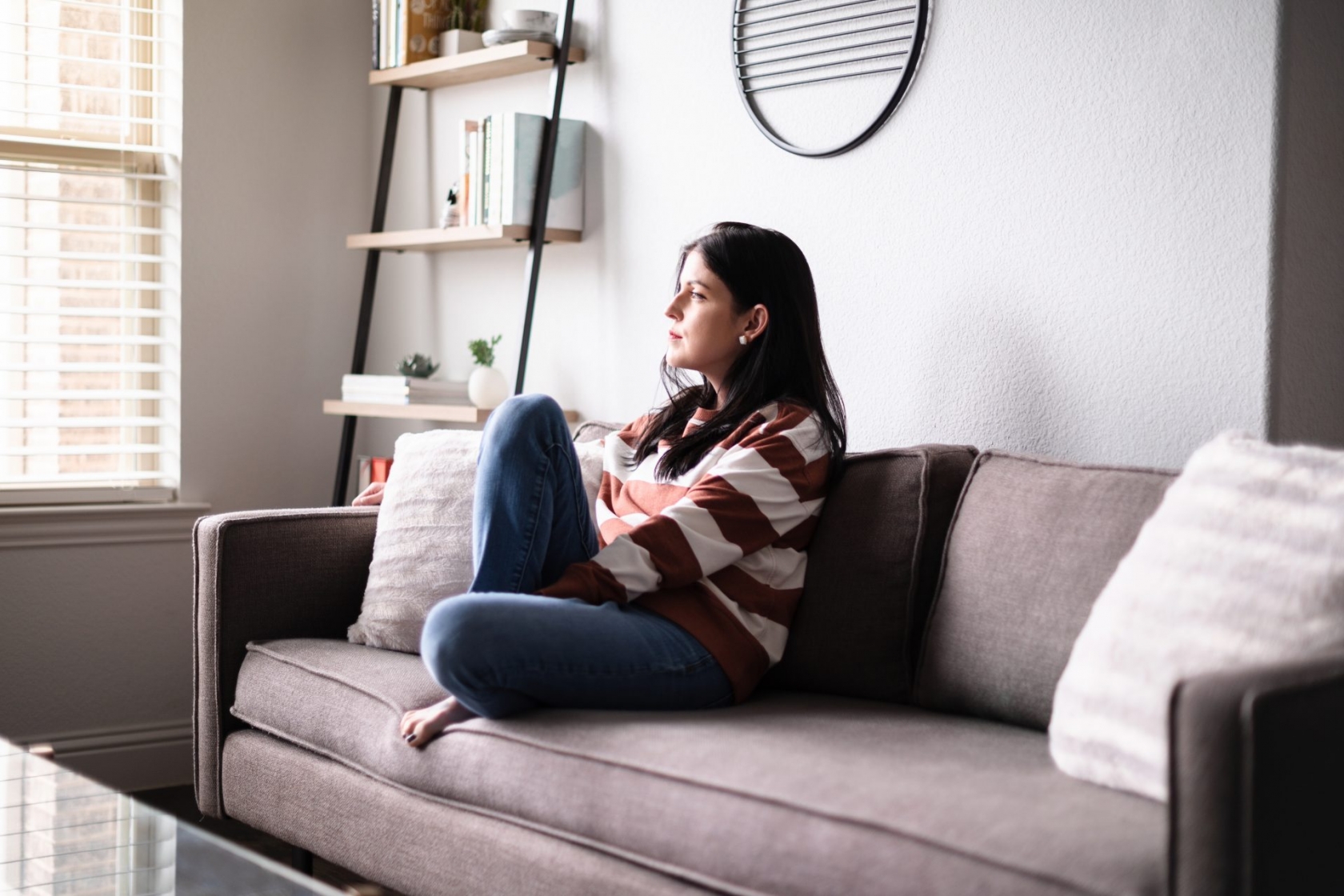You’re not the only one thinking it – this lockdown really does feel more difficult than the ones we’ve dealt with before. So why is this? And what can we do about it? Stylist investigates.
If you feel like lockdown 3.0 is the hardest one yet, you’re definitely not alone.
I, for one, am struggling to stay motivated. I no longer feel like I’m trying to ‘make the most’ of a bad situation or ‘look on the bright side’ as I did during the previous lockdowns – my bedroom has descended into a complete mess and the appeal of a daily walk is becoming lesser with the day. In all honesty, I feel like I’m simply surviving – going through the motions and trying my best to get through the chaos we seem to have found ourselves in yet again.
And as I say, I’m not the only one. You only need to look at social media to see that the consensus is painfully clear – getting through lockdown 3.0 has become a real challenge.
It’s weird, isn’t it? Having lived through two lockdowns by this point in the pandemic, you might assume that we’d know how to cope with yet another one. But despite all this, coping with life under lockdown 3.0 feels a lot more difficult. So, what’s happening here?
According to Mary Meadows, an accredited life coach and NLP practitioner, the struggle we’re facing right now could have a lot to do with fatigue.
“At this point we’re dealing with the weariness of being nearly a year down the line in this pandemic, during which our nervous systems have been on pretty much constant high alert because of the uncertainty of this situation,” she explains. “We also seem to have lost our motivation to connect with people, not having any energy left to even manage a WhatsApp conversation with a friend let alone another Zoom call, and this lack of connection can impact our mental wellbeing.”
On top of this, Meadows points out that the time of year this lockdown is taking place in – “the most depressing month of the year when the days are short, weather’s shit, finances are tight and the greyness outside seems to mirror our mood” – could be adding to the strain the restrictions are having on our wellbeing. And that’s not forgetting the fact that, as things currently stand, we have no idea when the lockdown might end.

What Meadows is saying makes a lot of sense – particularly that point about no longer connecting with friends. I don’t know about you, but I’ve gone into a kind of hibernation mode, only poking my head out for work meetings and the occasional one-to-one chat. Unlike during the first two lockdowns, I can’t be bothered with Zoom get-togethers and big group chats – not just because I’m mentally and emotionally exhausted, but simply because I feel like I have nothing to talk about.
With this in mind, one of the first things Meadows suggests when I ask her how to make this lockdown a little easier is trying to prioritise connection – even if we really don’t feel like it.
“Connection with others is a basic human need so, as much as it pains me to say, we have to make an effort to communicate and connect with others, no matter our mood,” she says. “Try to make it an essential, non-negotiable part of your day.”
To make communicating with a friend or family member more beneficial for both of you, Meadows recommends avoiding ‘how are you?’ (“the majority of us don’t even know where to start when someone asks that, no matter how well-intended”) and instead opting for something a little bit more engaging.
“Try something like ‘What’s on your mind right now?’ ‘Have you had a shower yet today?’ ‘Are you taking care of yourself today?’ ‘Is there any way I can support you right now?’ ‘What are you looking forward to today/this week?’” she says.
Alongside making time for connection, Meadows says focusing on the small things could help to give our minds a break from everything they’re dealing with right now.
“If ever there was a time to focus on the small stuff, it is now,” she explains. “That cup of tea you are about to make? Savour the whole experience – start with some deep breaths in through your nose out through your mouth whilst the kettle boils. Choose your best mug (we’ve all got one!) and focus on all the sensations while you are sipping your tea – what can you smell? How does it taste? What can you hear? What can you see? How does the cup feel in your hands?”

Meadows continues: “Engaging in small moments like this lets our brains rest in the present moment, and by doing so we feel a short relief from the constant whirring of our thoughts. It won’t fix your never-ending work to-do list or cook the next meal for you, but it will help your mental wellbeing if you can manage a few minutes each day.”
Another way to do this is by using what Meadows calls a “joy jar” – a system in which you notice every time you feel joy (however small), write it down on a piece of paper and pop it in a jar or container. At the end of the week, you can empty out the jar and relive those little moments of happiness, only to repeat the process again.
“Keep it small and simple, anything at all that makes you smile,” Meadows adds. “For example, I just noticed a new leaf unfurling on one of my houseplants, so I’d write that down.”
Meadows’ tips may not have the potential to solve all the problems we’re facing right now, but they’re a great place to start if you’ve found yourself struggling during lockdown 3.0 and fancy giving them a go.
But remember – while trying one or all of these tips is a great idea if you’re struggling, it’s important to remember that getting through every day is an achievement in itself right now. If you need to spend the evening watching Netflix under a bundle of blankets, then that’s OK, too. Whatever floats your boat.
If you, or someone you know, is struggling with their mental health, you can find support and resources on the mental health charity Mind’s website and NHS Every Mind Matters or access the NHS’ list of mental health helplines and organisations here. Additionally, you can ask your GP for a referral to NHS Talking Therapies, or you can self-refer.
For confidential support, you can also call the Samaritans in the UK on 116 123 or email [email protected].
Images: Getty
Source: Read Full Article
